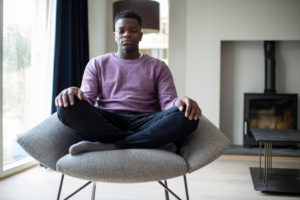
Some of you might see that and say, “yeah right!” But stick with me a moment.
It’s true that the risk for illness indeed goes up with age, and you might not have the energy and mobility as you once did. There might be a lot of change to keep up with. And of course, the coronavirus pandemic isn’t doing much to improve life at the moment.
But one trait that may come along with age can make these challenges a bit easier. It can relieve stress, which, in turn, may reduce blood pressure, improve sleep, maintain memory, enhance mood, and make life a little better.
Recent research has found that mindfulness is more evident in people of advanced age and can contribute to a greater sense of well-being. It’s possible that this association exists because older folks have more experience and are less likely to sweat the small stuff.
Or even the big stuff.
Mindfulness is the idea that humans can slow things down and exist in an individual moment, observe the present, and reserve judgment. It places people in the here and now, what they are immediately feeling and experiencing, avoiding outside thoughts.
The practice has been identified by several experts as a useful way to reduce stress, pain, and help foster a number of positive physical and mental health outcomes.
Of course, not everyone can just jump into a mindful state. There is no shortage of things to worry about and stress over. Here are some of the tenants of mindfulness and how to use them.
- Develop an awareness of thoughts and surroundings that focus on the present in an open and honest yet non-judgmental way. Limiting thoughts like this can help you avoid focusing on the past or future in unhelpful ways.
- Understand that the feelings you’re having at the moment—particularly bad or challenging ones—will pass. This can allow for more flexible and optimistic responses.
- Managing exposure to stressful information, like news, by setting boundaries and consumption limits.
There are several resources available to help you practice mindfulness. Some popular ones include the Calm app and Headspace, which provide various ways of learning and practicing mindfulness wherever you are.